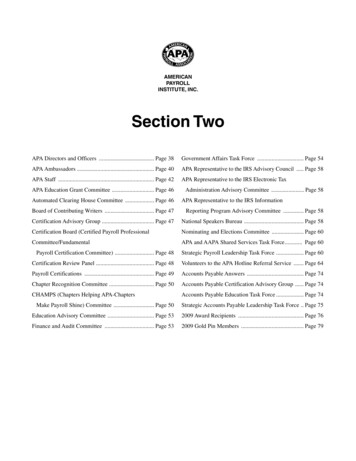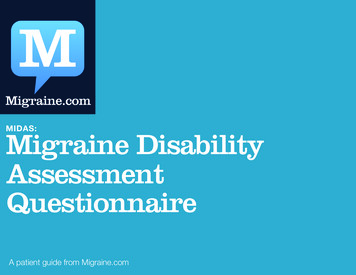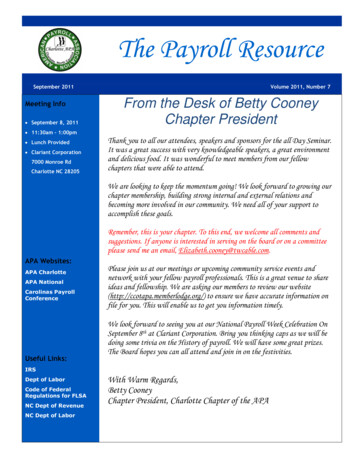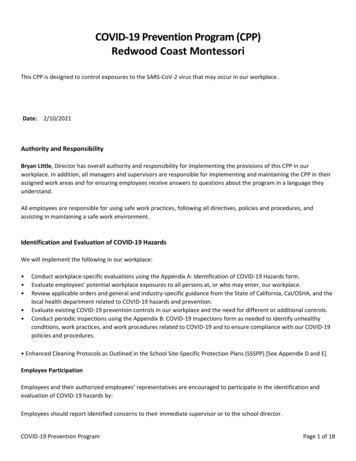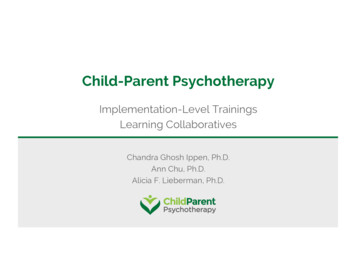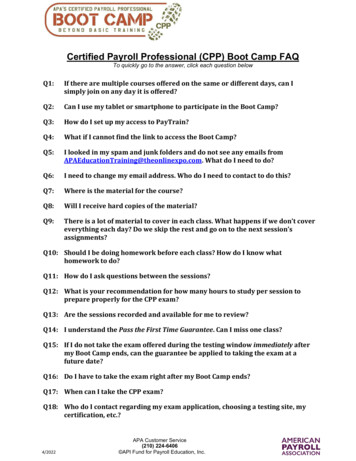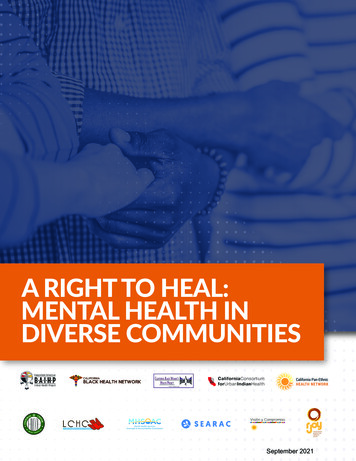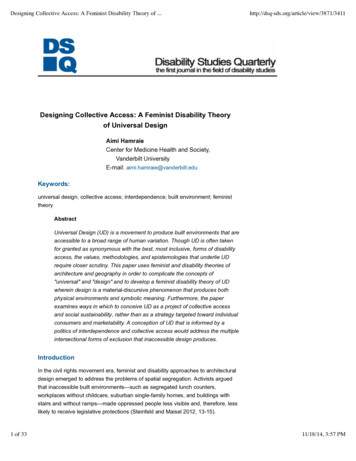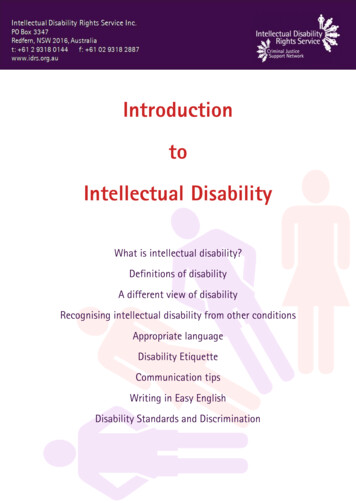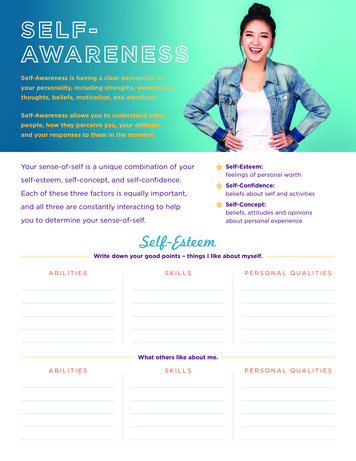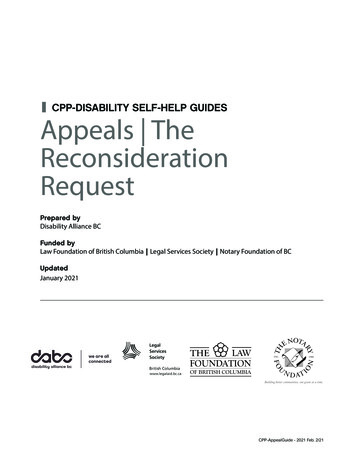
Transcription
CPP-DISABILITY SELF-HELP GUIDESAppeals TheReconsiderationRequestPrepared byDisability Alliance BCFunded byLaw Foundation of British Columbia Legal Services Society Notary Foundation of BCUpdatedJanuary 2021CPP-AppealGuide - 2021 Feb. 2/21
CPP Disability Self-Help Guides Appeals The Reconsideration RequestCONTENTSAbout CPP.3Qualifying for CPP-D.3The CPP-D Appeal Process.4The Reconsideration Request: An Overview.4The Denial Letter: Reasons People are Denied CPP-D.5Disability is Not Severe and Prolonged.5Not Enough Contributions.6Late Applicants .6Getting Started on Your Request for Reconsideration.7Step 1 Writing to ESDC.7Step 2 Requesting Your File.8Step 3 Reviewing Your File.9Step 4 Putting Your Case Together.9Step 5 Getting Medical Letters.11Step 6 Other Supporting Documentation and Your Own Letter.12Step 7 Compiling Your Information for Reconsideration.13After You Send Your Request. 14If Your Reconsideration Request is Successful.15If Your Reconsideration Request is Not Successful.15Appendix A Contributions Required to Qualify for CPP-D. 16Appendix B CPP Legislation Definition of Disability . 18Appendix C Contacts and Resources . 19Appendix D Letter to Your Doctor(s). 20Appendix E Advocacy Resources. 21Prepared by Disability Alliance BC’s CPP Disability Benefits Program. Thank you to the Law Foundation ofBritish Columbia, Legal Services Society and the Notary Foundation of BC for funding this series.Disability Alliance BC204-456 W. Broadway, Vancouver, BC V5Y 1R3tel: 604-872-1278 toll free 1-800-663-1278fax 604-875-9227www.disabilityalliancebc.orgThe full CPP Disability series and all DABC publications are available free at:www.disabilityalliancebc.org/publications/. Information in this Guide is based on the legislation that was current at the time of writing. Thelegislation and policy may be subject to change. Please check the date on this Guide.page 2 Disability Alliance BC
CPP Disability Self-Help Guides Appeals The Reconsideration RequestIf your application for Canada Pension Plan disability benefits (CPP-D) has beendenied, you have the right to appeal. Disability Alliance BC (DABC) has preparedthis self-help guide to help you with the first stage of the CPP-D appeal process:the reconsideration request. If you have had your reconsideration request denied,please see our CPP Disability Information and Assistance publication “The SocialSecurity Tribunal: A Self-Help Guide for Canada Pension Plan Disability Appeals.”About CPPThe Canada Pension Plan (CPP) is administered by the federal government.The department responsible for CPP is Employment and Social Development Canada(ESDC).The CPP operates in every province, except Quebec which has a similar program calledthe Quebec Pension Plan. The CPP legislation provides a number of different benefitsincluding: disability benefits (CPP-D) benefits for children of people receiving CPP disability benefits retirement pensions death benefits survivor’s benefits benefits for children of deceased contributorsNOTE This guide deals with CPP-D benefits only.Qualifying for CPP-DTo qualify for CPP-D, you need to meet three basic criteria. You must: be under 65 years of age have made the required amount of contributions to CPP in the years before youbecame disabled. For example, if ESDC determines that you becamedisabled on or after January 1st 1998, then you must have worked andcontributed to CPP in four of the six years before you became disabled(please see Appendix A on page 15 of this guide for more information oncontributions) have a “severe and prolonged” disability as defined in the CPP legislation.The CPP legislation defines a “severe” disability as one that makes “a personincapable of regularly pursuing any substantially gainful occupation.” A“prolonged” disability is one that is “likely to be long continued and ofindefinite duration or is likely to result in death ” (please see Appendix B ofthis guide for the exact wording of the CPPD’s definition of disability).Disability Alliance BC page 3
CPP Disability Self-Help Guides Appeals The Reconsideration RequestThe CPP-D Appeal ProcessStage 1The reconsiderationTo appeal: write toESDC within 90 daysof receiving your denial letter from ESDC.Stage 2Stage 3Appeal to the Social SecurityTribunal – General DivisionAppeal to the Social SecurityTribunal – Appeals DivisionSubmit a Notice of Appealform to the SST GeneralDivision within 90 days ofreceiving your denial letterfrom ESDC.Submit an ApplicationRequesting Leave (Permission)to Appeal form to the SSTAppeals Division within 90 daysof receiving the decision fromthe General Division.The Reconsideration Request: An OverviewAs you can see from the diagram above, if ESDC turns down your CPP-D application,you have 90 days to write to ESDC to let them know you want them to reconsider theirdecision. The 90 days starts from the day you receive the letter telling you that yourCPP-D application has been denied.The person who reviews your case on reconsideration will not be the same person whoturned down your application.On reconsideration, you can provide new information that you think will help your case.This can include letters from your doctor and other health professionals that addressthe reasons why your application was turned down. You can also include letters fromfamily or friends who are familiar with your medical condition, although these will notcarry the same weight as those from medical professionals. ESDC may also seek additional medical information or ask you to see another doctor. The review of thereconsideration can take several months.ESDC can take several months to make a decision on a reconsideration request. If youare successful on reconsideration, and your denial is overturned, you should receive alump-sum payment, as well as monthly CPP-D benefits.page 4 Disability Alliance BC
CPP Disability Self-Help Guides Appeals The Reconsideration RequestThe Denial Letter: Reasons People are Denied CPP-DBefore preparing your request for reconsideration, it is very important that you have aclear understanding of why ESDC has denied your application. Read ESDC’s denialletter carefully, as many times as you need to. And, if you think it will help you, makesome notes on what the letter says.As mentioned in previous sections, to qualify for CPP-D you must be under age 65, havemade the required amount of contributions and have a disability that is severe andprolonged, as defined by CPP. The letter from ESDC telling you that your application hasbeen denied will tell you the specific reasons why the department has decided that youdo not qualify.The denial letter will usually refer to the medical reports, doctors’ opinions and otherdocuments that ESDC has reviewed. In the letter, ESDC will usually state whatinformation it has used to arrive at its decision. Also included with your denial letter willbe an information sheet entitled: How to Ask Canada Pension Plan (CPP) Disability toReconsider Its Decision.Disability is Not Severe and ProlongedThe most common reason people are denied CPP-D is that ESDC does not accept thatthe applicant’s disability is sufficiently severe and prolonged. The standard CPP-Ddenial letter telling an applicant this will say:“You do not have a disability that is both severe and prolonged as defined under theCPP legislation.”SevereIn Appendix B of this guide, you will see that the CPP-D definition says a person’sdisability is severe when the person is “incapable regularly of pursuing anysubstantially gainful employment.” In other words, you must show that your medicalcondition(s) is so severe that you cannot work at any job regularly enough to earn aliving.A denial letter telling someone that his or her disability is not sufficiently severe to stopthem from working may say something like this:While you may not be able to do your job as a welder, we concluded that you should stillbe able to do some type of work. We understand that you have limitations. However, weconcluded that the information does not show that your limitations prevent you fromdoing some type of work.This means that, after reviewing the evidence, ESDC has decided that although theperson cannot do his or her former job, they should still be able to do some type ofwork. In other words, their disability may be prolonged, but it is not sufficiently severe toqualify for CPP-D.Disability Alliance BC page 5
CPP Disability Self-Help Guides Appeals The Reconsideration RequestKeep in mind that ESDC places a lot of importance on what your doctor(s) says aboutyour medical conditions and limitations, and on any medical reports that are submitted.It is important that your doctors’ reports explain your condition and why it prevents youfrom working. When there is little medical evidence that clearly shows your impairment,ESDC may assume you can do some sort of work.If, for example, your doctor says you are no longer able to perform physical activitiessuch as bending and lifting, ESDC may decide you can do office work. Or, if your doctorsays you are responding well to treatment, ESDC may assume your condition is notserious enough to stop you from working.ProlongedSometimes CPP-D applications are denied because ESDC has decided that theapplicant’s medical condition is not prolonged. This can happen if, for example,someone applies for CPP-D, but is scheduled to have surgery for her condition. ESDCwill also likely decide that an applicant’s condition is neither long term nor of unknownduration (prolonged) if there is medical evidence suggesting that a full recovery isexpected by a certain date.Not Enough ContributionsThe Minimum Qualifying Period (MQP) is the minimum period of time that you must haveworked and contributed to CPP in the years immediately before you became disabled(as defined in the CPP legislation) in order to be eligible for CPP-D benefits. SeeAppendix A of this guide for an explanation of MQP.Occasionally, an application will be denied because ESDC determines that theapplicant has not contributed enough. If you believe a mistake has been made incalculating your contribution period, or you think a provision could be applied for thataffects your contribution period and MQP date, you should contact ESDC right away.NOTE If you do not have sufficient contributions there is no basis for reconsideration.There are no provisions in the legislation that allow ESDC to reconsider a decision oncompassionate grounds.Late ApplicantsYou may also be denied if you do not apply for CPP-D soon enough after you becomedisabled. For example, if you take too long to apply, you may not meet the four out of sixyear test. This is the rule that says you must have contributed to CPP for four out of thesix years immediately before you apply for CPP-D.In these situations, it is sometimes possible to use the Late Applicant Provision (formore on this Provision, see Appendix A). This allows an applicant to have an MQPpage 6 Disability Alliance BC
CPP Disability Self-Help Guides Appeals The Reconsideration Requestcloser to the onset of their disability. Late applicants have to prove that their health hasstopped them from working ever since their MQP which, because they applied forCPP-D late, may be a considerable time in the past.Getting Started on Your Request for ReconsiderationStep 1 Writing to ESDCThe first step in the reconsideration request process is to write to ESDC within 90 daysof receiving your denial letter to say you want them to reconsider their decision. The 90days start from the day you receive your letter.We recommend that people use the Request for Reconsideration of a Canada PensionPlan Disability Decision form available online at ms/en/Detail.html?Form ISP1145 or call ESDC toll free at 1-800-277-9914.The reconsideration form covers all of the information needed to start the processincluding: contact information (page 2); date the decision letter was received. If it has been more than 90 days since youreceived your denial letter you must request an extension and include thereasons why you were late and the steps that you took that would prove you wereplanning on appealing the denial all along. If those are compelling enough ESDCmay still process an appeal (page 2); If you will be trying to collect additional information and any approximatetimelines that you may have for when that will come in (page 3); reasons why you would like ESDC to reconsider its decision such as “I do notagree with the medical adjudicator’s decision. I will be requesting my file andonce I have had a chance review it I may have additional reasons” (page 3); your original signature and the date; and your Social Insurance Number on each page.We have provided the contact information for ESDC in Appendix C on page 18 of thisguide.Disability Alliance BC page 7
CPP Disability Self-Help Guides Appeals The Reconsideration RequestStep 2 Requesting Your FileOnce you have informed ESDC that you would like a reconsideration, you need toask for your file. To do that, you need to send in an Info Source: Personal InformationRequest form. You can get this form by calling ESDC toll free at 1-800-277-9914, oryou can get it online at dfFill out the Info Source form and mail it to ESDC. They require an original signatureand will not accept a fax or a photocopy. There are two ways that you can do this:1. you can return it to your nearest Service Canada office or2. you can send it to: Privacy Coordinator, Service Canada, PO Box 1177,Victoria, BC V8W 2V2.The Info Source form allows you to get a copy of your complete file. It will takeabout 5-6 weeks to receive the file. When your file arrives, it will include: your application form your doctor’s medical report the disability summary sheet which will tell you why ESDC denied your claim other documentation sent to ESDC that you may not have seen, such asletters from your doctor.page 8 Disability Alliance BC
CPP Disability Self-Help Guides Appeals The Reconsideration RequestStep 3 Reviewing Your FileThe disability summary sheet will tell you why your application was turned down.Read the section called “Rationale.” This section contains the adjudicator’s reasonsfor the denial of your claim.The summary helps you to review your file. Ask yourself: have they overlookedanything important? Are there any errors or omissions in their information? This willgive you an idea of the kind of material that would be important to include in yourappeal. When you have finished reviewing the summary sheet, it is time to look at therest of your file.Review pages 7 to 10 in the application you filled out. These questions look at yourdisability and the impacts that it has on your life and your ability to work. Has itdescribed in detail how you disability prevented you from performing duties at yourlast job? Has it described in detail why your disabilities prevent you from retraining?Did it miss out unpredictable “bad days” that you cannot plan for when it asked youto rank only your “typical” day? This information can be used in your appeal.Read the Medical Report that was completed by your doctor. Is it accurate? Doesyour doctor appear to be supportive? How has your disability been summarized?What has been said about your prognosis? Has anything been said about yourability to work? If you have more than one health condition, has your doctor includedinformation about all of them?Also, check to see if other medical information is included. Is there anything therethat you were not aware of? Is the medical information consistent or contradictory?Has any doctor said or implied that you are able to work or that your conditionwill improve?By answering these questions, you will focus on the most important issues. Thesenotes will be useful as you work through the appeal process.Step 4 Putting Your Case TogetherHaving written to ESDC within 90 days to tell them you are requesting areconsideration (see Step 1 above), your reconsideration will be in process already,but you will need to do more to have the best chance of winning.After reading your denial letter and reviewing your file, you should have a good ideawhy ESDC turned down your CPP-D application. This section will help you to get aclear understanding of what information you can use to satisfy CPP-D that you areeligible.Disability Alliance BC page 9
CPP Disability Self-Help Guides Appeals The Reconsideration RequestStart by asking yourself these three questions:1. Does your disability prevent you from working regularly?2. Is your condition unlikely to significantly improve in the foreseeable future?3. Does your doctor(s) acknowledge the limitations that your disability causes inyour daily life and your ability to work?The answer to all these questions needs to be “yes” for you to have a chance ofsuccess with your appeal. If the answer to #3 is “no,” you should speak to your doctorbecause, without supporting medical documentation, it will be extremely difficult to winyour reconsideration request. Here are some things to consider: Does your doctor think you have a severe and prolonged disability? Is yourdoctor willing to write a letter of support and help you obtain additionalinformation? If your doctor is willing to work with you, it will make your joba lot easier (medical letters will be covered in more detail in later sections ofthis guide). How well has your doctor described your disability? Are there existingmedical reports or letters that were not submitted with your CPP-D applicationthat can be submitted now? If you have more than one medical condition,information about how all these conditions impair your daily functioning isimportant. If you can help your doctor to understand in detail how yourcondition affects your ability to function, your doctor will be able to do a betterjob of supporting your case. Were medical reports submitted with your CPP-D application that are out-ofdate, inaccurate or took an overly-optimistic view of your degree of restrictionor prognosis? For example, sometimes a doctor will assume that arecommended treatment will be effective, but it was not. We suggest that youtalk with your doctor about these kinds of issues because they will need to beaddressed in your appeal. What new medical information can be obtained? This point is particularlyimportant if your condition is getting worse over time. It may be a good ideafor your doctor to refer you to specialists or other health professionals to getnew assessments. However, find out how long it will take to receive this newinformation. If it is going to take a long time, we suggest you contact ESDCand speak to them about any deadline concerns you may have. Cultural, educational and social barriers to employment may be considered asfactors that affect your ability to work. How realistic is it for you to be retrainedfor other kinds of occupations? For example, if you have limited languagework in a job that requires strong language skills.page 10 Disability Alliance BC
CPP Disability Self-Help Guides Appeals The Reconsideration Request What has happened since you left your last job? If you have tried lighter workrelated activities or a retraining program and failed, it is important to point thisout. Even if you have skills, your disability may prevent you from keeping a job.Third parties, such as instructors or employers that can confirm your healthrelated job restrictions, can be asked for a letter of support. People who have medical conditions with an unclear prognosis may run intodifficulty. The term “long continued” implies that a condition must be morethan temporary. To qualify for CPP-D, your medical prognosis should, at thevery least, establish that you are unable to return to the workforce within aforeseeable and reasonable period of time. Have you qualified for any other disability benefits programs since you leftwork? Although qualifying for one disability program does not mean you willautomatically qualify for another, sometimes the medical reports associatedwith the other programs can be of use. Disabilities tend to affect people in different ways, even when diagnoses aresimilar. It is important to detail the particular facts of your case. For example,submitting articles about your disability from medical journals rarely makes adifference. It is much more helpful to provide a medical letter talking aboutthe specific things you cannot do because of your disability.Step 5 Getting Medical LettersWe have stressed in this guide the importance of obtaining good medical evidence tosupport your reconsideration request. We are also aware that doctors do not have a lotof time to write letters, and will often charge a fee to do so. ESDC will only pay formedical letters that they request, and not for letters you request.Therefore, if your doctor agrees to provide a letter, it is extremely important that theletter contain the right kind of information. Specifically, it is crucial that your doctoraddress the deficiencies in your application, as identified in ESDC’s denial letter.You should talk with, or write to, your doctor clearly explaining that you need them towrite a letter addressing the specific points on which ESDC based its denial. Ifpossible, you should show your doctor the denial letter.Please see Appendix D on page 19 of this guide for a sample request letter that youcan use if you want to write to your doctor.Disability Alliance BC page 11
CPP Disability Self-Help Guides Appeals The Reconsideration RequestWhich doctor(s) should you ask for a support letter?The General Practitioner or Family Doctor (GP)The advantage of information from your family doctor is that they probably know youbetter than a specialist. Also, if you have more than one condition, your GP may havethe best understanding of how your combination of disabilities affects your daily lifeand your ability to work. The disadvantage is that ESDC will sometimes reject theopinion of a GP if there has been a different opinion expressed by a specialist.The SpecialistIt is important to have up-to-date information from a specialist (e.g., neurologist,psychiatrist, rheumatologist) who is involved in your case. The opinion of a specialist isoften given greater weight than your family doctor’s opinion because they areconsidered to have more in-depth knowledge. The problem is that a specialist may notknow you very well if you have only had a couple of visits. The specialist may also onlybe able to comment on one of many conditions. For example, a psychiatrist is unlikely tohave information regarding a physical condition.One option is to request support letters from all your doctors. Another option is to askyour GP to write a letter explaining how your multiple conditions combine to prevent youfrom pursuing gainful employment on a regular basis. If you ask your GP for a letter, it ishelpful if the GP can review any reports from your specialists, and mention in the letterthat he or she has done so.We recommend that you talk to your doctor(s) before they write a letter. Find outwhether they can provide the information outlined above and whether they support yourapplication for CPP-D. Find out how much it will cost and how long it will take them towrite a letter for you.If none of your doctors are supportive, there is no point asking for a medical letter andyou may wish to seek the advice of an advocate.NOTE CPP will only pay for letters that they request. Ask your doctor about any costsinvolved before requesting support letters. You can ask CPP to contact a doctor, if youbelieve there is new information that he or she can provide.Step 6 Other Supporting Documentation and Your Own LetterIn addition to letters from your doctors, you may also provide ESDC with letters fromother health professionals who have been involved in your treatment and care. Forexample, you can request letters from physiotherapists, mental health workers, nurses,podiatrists and psychologists, to name a few. Many of these people can provide relevantinformation that could help your appeal.page 12 Disability Alliance BC
CPP Disability Self-Help Guides Appeals The Reconsideration RequestYou may also provide ESDC with letters from past employers and vocationalrehabilitation personnel, who may be in a position to comment on how your disabilityaffects your ability to pursue and maintain employment.It may also be helpful to submit documentation related to any other disability benefitsprograms you have applied for. Be sure to review it for relevance or for any informationthat could be used to discredit your appeal. Do not use documentation that containsunhelpful or confusing information.Finally, you can also ask family and friends to provide letters, if they are in a position tocomment specifically on how your disability affects your ability to pursue and maintaingainful employment.Once you have gathered letters from your doctor and other support people, it is a goodidea to write your own covering letter too. In your letter you can give: your personal experience of your disability, including your symptoms and thetreatments you have tried a profile of a typical day and examples of the limitations you live with, and examples of how your disability has affected your ability to perform workrelated activities.Step 7 Compiling Your Information for ReconsiderationThe information you send in to support your reconsideration request should focus onthe facts of your disability, and should show that you fulfill the criteria of disability, asdefined by the Canada Pension Plan.As described above, you may want to send in any or all of the following: a covering letter from you letters from doctors letters from other health professionals letters from past employers, or vocational rehabilitation personnel documentation about other disability benefits you may be receiving, and letters from friends and family.Disability Alliance BC page 13
CPP Disability Self-Help Guides Appeals The Reconsideration RequestFor the best chance of success, you should have: sent a letter to ESDC within 90 days of the denial letter saying that you wish toappeal the decision. requested and reviewed your CPP-D file. obtained doctors’ letters that provide the medical reasons why your disability issevere and prolonged. included other support letters, where possible, that help describe the fullextent of your disability. written a letter that explains, in your own words, how your condition affectsyou on a daily basis and limits your ability to work.Before the package is sent in, make a copy of all the documentation for your records. Itis also a good idea to send the documentation via registered mail. Make a note of whenyou mail the package, and send it to:CPP Applications and Appeals DivisionService CanadaBC & Yukon RegionPO Box 1177, Station CSCVictoria, BCV8W 2V2After You Send Your RequestOnce the reconsideration request is sent in, you will have to wait a few months for adecision. You can send in additional information during that time, especially if there isany change in your condition.ESDC may also ask you to see a doctor of their choosing or may ask for updates.It is important to comply with these requests; if you ignore them, you will put yourappeal at risk.ESDC will send you a letter that tells you whether your appeal has been accepted ordenied.page 14 Disability Alliance BC
CPP Disability Self-Help Guides Appeals The Reconsideration RequestIf Your Reconsideration Request is SuccessfulCongratulations! You can expect to receive a retroactive payment that is
Security Tribunal: A Self-Help Guide for Canada Pension Plan Disability Appeals." About CPP The Canada Pension Plan (CPP) is administered by the federal government. The department responsible for CPP is Employment and Social Development Canada (ESDC). The CPP operates in every province, except Quebec which has a similar program called
